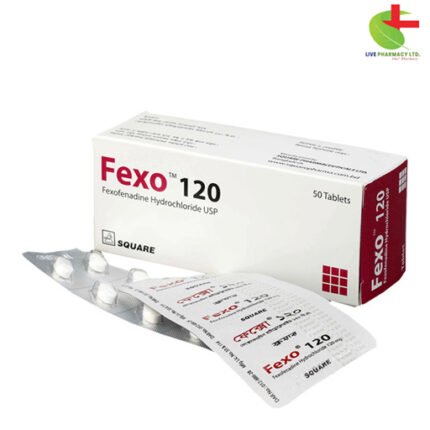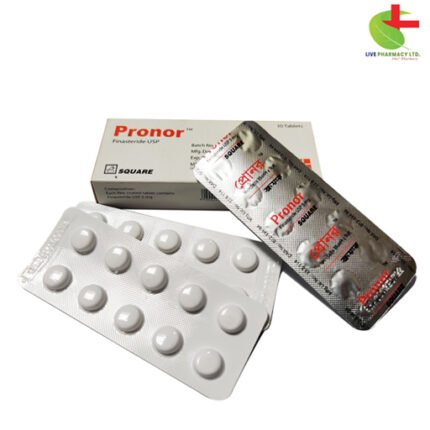Fexo 180
100.00৳ Strip
- Fexo, a reliable remedy for allergic rhinitis and chronic idiopathic urticaria, is available.
- Suitable for adults and children aged 12 and above, Fexo effectively alleviates symptoms.
- Its targeted pharmacology addresses histamine receptors without causing sedation.
- Precise dosage guidelines ensure optimal relief with minimal side effects.
 Brand
Brand
|
Square Pharmaceuticals PLC |
|---|---|
 Generics
Generics
|
Fexofenadine Hydrochloride |
Indications
Seasonal and Perennial Allergic Rhinitis: Fexo is indicated for alleviating symptoms associated with both seasonal and perennial allergic rhinitis in individuals aged 12 and above. These symptoms include sneezing, runny nose, teary eyes, itchiness in the eyes, nose, palate, and throat. Fexo not only effectively treats these symptoms but also enhances health-related quality of life and productivity in daily activities.
Chronic Idiopathic Urticaria: Fexo is recommended for managing symptoms related to chronic idiopathic urticaria in individuals aged 12 and older. It significantly reduces the signs and symptoms of chronic idiopathic urticaria, including the number of hives and itching. Fexo has shown to improve health-related quality of life and productivity in daily activities.
Pharmacology
The H1 histamine receptor plays a crucial role in mediating hypersensitivity and allergic reactions. When exposed to allergens, mast cells and basophils undergo degranulation, releasing histamine and other inflammatory mediators. Histamine binds to H1 receptors, triggering the release of pro-inflammatory cytokines such as interleukins from basophils and mast cells, leading to various allergic symptoms like itching, runny nose, and watery eyes.
Fexofenadine acts as an “inverse agonist” of the H1 receptor by binding to and stabilizing its inactive form, thereby preventing its activation and subsequent downstream effects. It exhibits potent and selective affinity for H1 receptors without any significant antidopaminergic, antiserotonergic, anticholinergic, sedative, or adrenergic blocking activity. Fexofenadine’s inability to cross the blood-brain barrier makes it unlikely to cause significant central nervous system (CNS) effects.
Dosage & Administration
Allergic Rhinitis:
- Adults and children aged 12 and older: Tablet: 60 mg twice daily, or 120 mg once daily, or 180 mg once daily. Adjustments may be necessary in cases of impaired renal function.
- Children aged 6 to 11 years: Tablet: 30 mg twice daily, or 60 mg once daily. Adjustments may be necessary in cases of impaired renal function.
- Children aged 2 to 11 years: Suspension: 30 mg or 5 ml twice daily. Adjustments may be necessary in cases of impaired renal function.
Chronic Idiopathic Urticaria:
- Adults and children aged 12 and older: Tablet: 60 mg twice daily, or 120 mg once daily, or 180 mg once daily. Adjustments may be necessary in cases of impaired renal function.
- Children aged 6 to 11 years: Tablet: 30 mg twice daily, or 60 mg once daily. Adjustments may be necessary in cases of impaired renal function.
- Children aged 6 months to less than 2 years: Suspension: 15 mg or 2.5 ml (1/2 tsp) twice daily. Adjustments may be necessary in cases of impaired renal function.
- Children aged 2 to 11 years: Suspension: 30 mg or 5 ml (1 tsp) twice daily. Adjustments may be necessary in cases of impaired renal function.
Interactions
Fexo does not undergo hepatic biotransformation, minimizing interactions via hepatic mechanisms. Coadministration with erythromycin or ketoconazole may increase fexofenadine plasma levels. However, this does not impact QT interval or lead to increased adverse reactions compared to individual administration. No interaction has been observed between fexofenadine and omeprazole. However, antacids containing aluminium and magnesium hydroxide should be administered at least 2 hours apart from Fexo to avoid decreased bioavailability.
Contraindications
Avoid in patients with known hypersensitivity to Fexofenadine Hydrochloride or any of its components.
Side Effects
Common side effects in adults include headache, drowsiness, dizziness, and nausea. Rarely, hypersensitivity reactions may occur, presenting as angioedema, chest tightness, dyspnea, flushing, and systemic anaphylaxis. Other potential side effects include insomnia, nervousness, tachycardia, palpitations, diarrhea, rash, urticaria, and pruritus.
Pregnancy & Lactation
Limited data exist regarding the use of Fexofenadine hydrochloride in pregnant women. Animal studies suggest no direct or indirect harmful effects. Avoid use during pregnancy unless clearly necessary. Limited data suggest Fexofenadine may be excreted in human breast milk; caution advised during lactation.
Precautions & Warnings
Exercise caution in older individuals and those with renal or hepatic impairment. Patients with cardiovascular disease should be cautious due to potential adverse reactions like tachycardia and palpitations. Fexo is unlikely to impair driving or machinery operation, but individual responses may vary.
Use in Special Populations
Adjust dosage in patients with renal impairment. Moderate to severe hepatic disease has minimal impact on fexofenadine pharmacokinetics. Elderly patients may exhibit increased bioavailability of fexofenadine.
Overdose Effects
Overdose may result in dizziness, drowsiness, fatigue, and dry mouth. No clinically significant adverse reactions have been reported with single doses up to 800 mg. Symptomatic and supportive treatment is recommended. Haemodialysis is not effective in removing fexofenadine from the blood.
Therapeutic Class
Non-sedating antihistamines.
Storage Conditions
Store in a cool, dry place away from light and heat, and out of reach of children.
Chemical Structure
- Molecular Formula: C32H39NO4
- Chemical Structure: Fexofenadine Hydrochloride
Common Questions about Fexo 180 mg Tablet
- What is Fexo 180 mg Tablet?
Fexo 180 mg Tablet is an antihistamine that blocks histamine released during allergic reactions. - What are the uses of Fexo 180 mg Tablet?
Fexo 180 mg Tablet is used to treat allergic rhinitis and urticaria, relieving symptoms like runny nose, itching, sneezing, and hives. - What are the Side Effects of Fexo 180 mg Tablet?
Side effects may include vomiting, headache, coughing, diarrhea, painful menstruation, hives, redness of the skin, and swelling of the face, lips, eyelids, tongue, hands, and feet. - What are the instructions for storage and disposal Fexo 180 mg Tablet?
Store in a cool, dry place, and keep out of reach of children and pets. - Can Fexo 180 mg Tablet make you sleepy?
Yes, drowsiness is a common side effect of Fexo 180 mg Tablet. - Can you overdose on Fexo 180 mg Tablet?
Avoid overdosing, which may cause adverse reactions. Consult a doctor if an overdose occurs. - How quickly does Fexo 180 mg Tablet work?
Fexo 180 mg Tablet starts working within an hour, with peak effects observed within 6 hours. - Does Fexo 180 mg Tablet relieve symptoms of outdoor and indoor allergies?
Yes, it can relieve symptoms caused by outdoor and indoor allergens. - How to cope with dizziness caused by Fexo 180 mg Tablet?
Rest and avoid heavy machinery or driving if feeling dizzy. Consult a doctor if extreme dizziness occurs. - Can I take antacids while taking Fexo 180 mg Tablet?
Avoid using antacids concurrently, as it may decrease Fexo 180 mg Tablet’s absorption. - How should I take Fexo 180 mg Tablet?
Take as directed by a doctor to avoid adverse effects. - Is there any food or drink that I need to avoid while taking Fexo 180 mg Tablet?
Avoid consuming certain fruit juices while on Fexo 180 mg Tablet. - Can Fexo 180 mg Tablet cause heart problems?
Exercise caution if you have heart disorders; consider alternatives.
Quick Tips
Fexo 180 mg Tablet is less likely to cause drowsiness than other similar medicines. Avoid consuming certain juices and antacids with Fexo 180 mg Tablet.













Reviews
There are no reviews yet.